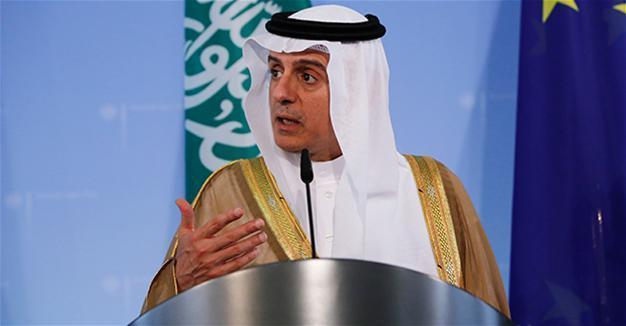Saudi foreign minister says Gulf states alone can solve Qatar row
DUBAI

AP photo
Saudi Foreign Minister Adel al-Jubeir said on June 7 that Gulf states could resolve a row with Qatar amongst themselves without outside help.“We have not asked for mediation, we believe this issue can be dealt with among the states of the Gulf Cooperation Council,” he told a news conference with his German counterpart in Berlin broadcast on Saudi state television.
His remarks came at a time when several countries, including Turkey and Iran, increased their efforts to introduce a diplomatic solution to the crisis.
“We see Qatar as a brother state, as a partner,” he told a joint press conference with German Foerign Minister Sigmar Gabriel, according to the German simultaneous translation.
“But you have to be able to tell your friend or your brother when they are doing the right thing and when they are doing the wrong thing.”
Saudi Arabia, the UAE, Egypt and Bahrain are among seven states that have cut diplomatic ties and many major transport links with Qatar, a gas-rich emirate on the Saudi border.
The Arab states accuse Qatar of supporting extremism, a charge Doha firmly denies.
Jubeir said that “for many years Qatar has taken steps to support certain organizations.”
“This has been condemned in the past, but unfortunately we have not received appropriate cooperation on this and that’s why these measures have now been taken.”
He added that “we have taken these steps in the interest of Qatar... and in the interest of security and stability in the region.”
“And we hope that our brother Qatar will now take the right steps in order to end this crisis.”
Qatar has forged regional alliances independently of its fellow GCC states, drawing accusations from Saudi Arabia and its allies of serving Iranian interests.
Gabriel said Germany “worried about the possible consequences and a growing escalation” after the “very tough” measures taken against Qatar.
A top Emirati diplomat, meanwhile, said “there’s nothing to negotiate” with Qatar.
Speaking in a rare interview, Emirati Minister of State for Foreign Affairs Anwar Gargash told The Associated Press that Qatar has “chosen to ride the tiger of extremism and terrorism” and now needed to pay the price.
Gargash said Qatar “absolutely” should expel members of Hamas, stop its support of terror groups “with al-Qaida DNA” around the world and rein in the many media outlets it funds, chief among them the Doha-based satellite news network Al-Jazeera.
While applauding a Kuwaiti effort to mediate the crisis, Gargash said Emirati and Saudi officials planned to concede nothing to Qatar, an international air travel hub now cut off from some of the skies around it and blocked from receiving the trucks full of food it relies on to feed its citizens.
Their “fingerprints are all over the place” in terror funding, Gargash said. “Enough is enough.”
While Qatar’s flag carrier Qatar Airways now flies increasingly over Iran and Turkey, the airline has been blocked from landing elsewhere in the Middle East. Al-Jazeera offices also have been shut down by authorities in Saudi Arabia and Jordan.
















